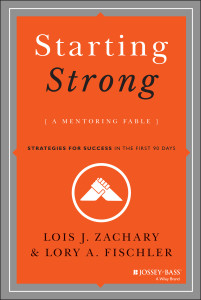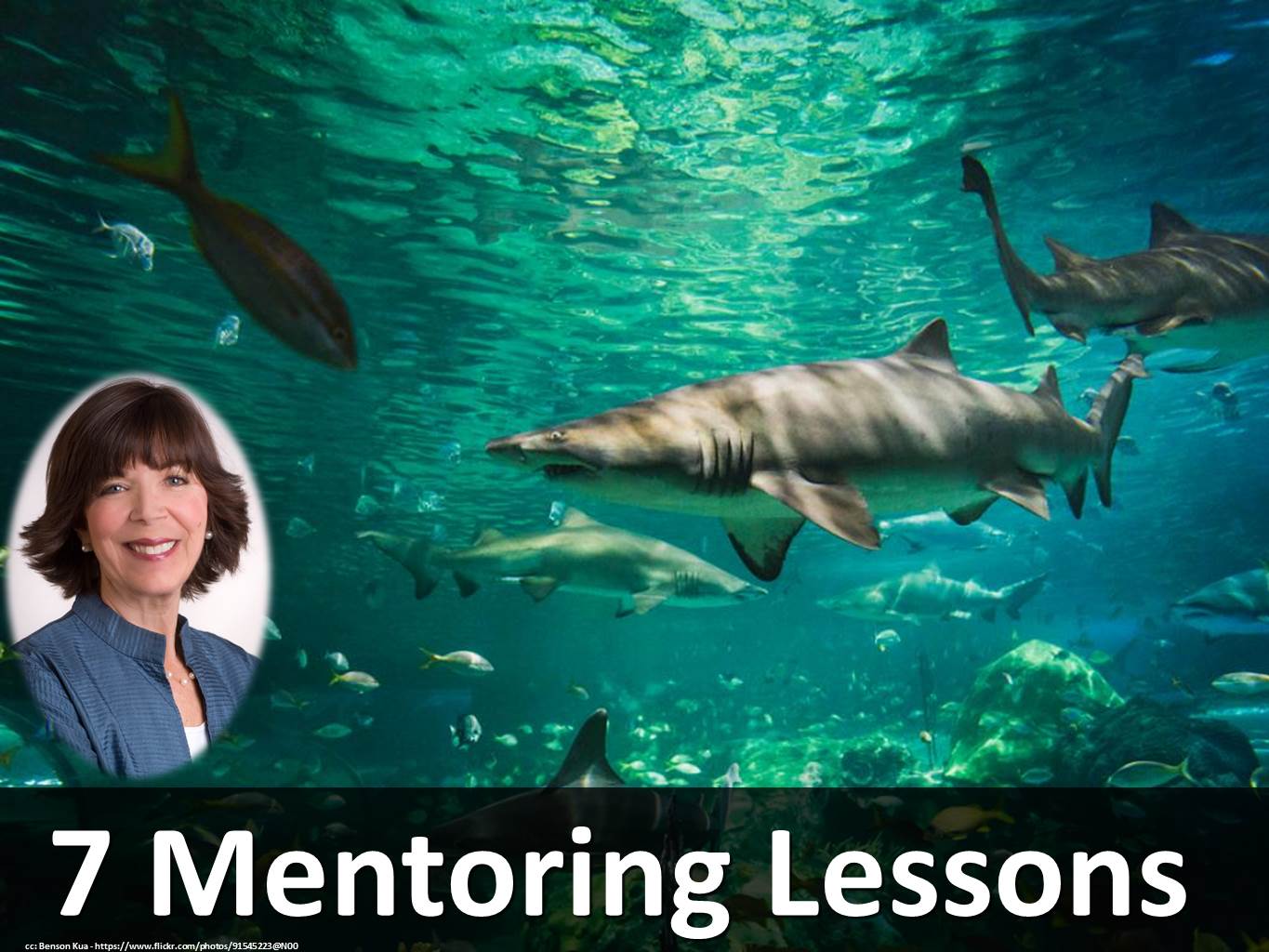
by Center for Mentoring Excellence | Mar 2, 2016 | Making Mentoring Work For You, Mentoring Relationships, Uncategorized
The idea of inserting accountability into a mentoring relationship may seem unnecessary. And yet, unless you build in a process to ensure accountability, there is always a temptation to sidestep it.
When mutual accountability becomes an ongoing expectation in a mentoring relationship it creates a shared frame of reference. It strengthens the relationship by improving communication and avoiding mentoring pitfalls. It enables partners to make midcourse corrections.
When mentoring partners engage in regular conversations about their mentoring relationship, it maintains the momentum of the relationship and contributes value to the learning of each mentoring partner.
Accountability conversations need not be cumbersome, but they should be held regularly, whether it is once a month or every quarter. If your relationship seems to be going well, checking in on its health will help ensure that you and your mentoring partner’s need are being met. At the same time, accountability conversations can assist you in gauging your progress over time and help you decide what you steps you can take to grow and improve your relationship.
We’ve developed a Mentoring Partner Check-In Accountability Tool to guide regular accountability conversations.You and your mentoring partner can complete this tool independently and then compare your responses. Or, you and your mentoring partner can complete this tool together.
You and your mentor should plan to use this tool periodically to ensure that you are staying on track. And, even if you haven’t agreed to do so initially, feel free to introduce this tool to your mentor partner at any time during your mentoring relationship. This may prove especially helpful if you suspect that your meeting time could be better utilized and you aren’t comfortable raising the issue with your mentor.
Use the Mentoring Partnership Check-In Accountability Tool throughout your relationship to make sure you stay on track and the trust level remains high.

by Center for Mentoring Excellence | Feb 11, 2016 | Making Mentoring Work For You, Uncategorized
Mentoring success depends on the degree to which mentoring partners roll up their sleeves and do the work. Yes, we said, “work.” Throughout your mentoring relationship, you and your mentoring partner need to be fully engaged in building and strengthening your relationship and focused on achieving your mentoring goals.
Mentoring Works Best When Mentees….
- Assume responsibility for their learning, growth, and development
- Set goals
- Hold themselves accountable for agreements
- Monitor their progress regularly
- Maintain receptivity to new, creative, and alternative strategies and ideas
- Are honest, open and willing to be vulnerable
- Communicate regularly
- Are prepared for and open to feedback
Mentoring Works Best When Mentors….
- Commit the time
- Build their relationship up front
- Ask questions rather than to try and solve a mentee’s problems
- Push and challenge their mentee
- Share experiences and challenges
- Offer options rather than answers
- Provide honest, ongoing, and candid feedback with care and compassion
- Maintain regular contact

by Center for Mentoring Excellence | Jan 5, 2016 | Making Mentoring Work For You
 Starting Strong: A Mentoring Fable provides a view inside six successful mentoring conversations that take place over 90 days. The reader is privy to the thoughts and reflections of both the mentor and mentee, and gets to observe the personal dynamics of a successful mentoring relationship as it unfolds. It’s an excellent training resource because it models how good mentoring should look and feel.
Starting Strong: A Mentoring Fable provides a view inside six successful mentoring conversations that take place over 90 days. The reader is privy to the thoughts and reflections of both the mentor and mentee, and gets to observe the personal dynamics of a successful mentoring relationship as it unfolds. It’s an excellent training resource because it models how good mentoring should look and feel.
Cynthia is one of the mentors you meet in the book. She is an experienced mentor who is committed to her own growth and development as a mentor and the growth and development her mentees.
The story of Cynthia and her Gen-Y mentee unfolds over 90 days (six mentoring meetings) and you get to sit in on each of them. You will hear their private thoughts before, during and after their meetings. At the end of each chapter, you will find questions to prompt personal reflection and spark conversation about the chapter content.
Cynthia learned the hard way about how to create a successful mentoring partnership. After a few failed mentoring relationships of her own, she grew from the experience. By the time she launched her next relationship, she was savvier and had a clearer understanding of what it takes to achieve tangible results.
What made the difference for Cynthia? What did she do differently that made her more successful?
In Starting Strong, you will learn about Cynthia’s strategies for mentoring success:
1. Cynthia recognizes that her mentee will be uneasy as the more junior employee, mentored by a senior executive. She takes time to get to know him and put him at ease before launching into the work of mentoring.
2. Some key structures and agreements help set the tone and expectations for progress and accountability. The mentee, who is new to mentoring, thought mentoring was an informal drop-in relationship.
3. Learning is the purpose and product of mentoring — and its goals drive the learning. Mentors and mentees alike struggle with goal setting. It can be tempting for mentees to pick goals they can easy achieve or that aren’t relevant to their work success.
4. Application of skills and learning are a critical part of mentee success.
5. Stumbling blocks are inevitable in mentoring relationships. Mentors and mentees need a confidential, safe place to get coaching around issues that surface.
6. The 90 day mark is an excellent time to schedule a check-in with mentoring partners.
The conversation playbook guides you so that you can engage in parallel conversation with Cynthia and her mentee. It prepares you for your mentoring sessions by suggesting appropriate conversation topics, starters and probing questions to use to build a solid foundation for your own mentoring relationships during the first 90 days.

by Center for Mentoring Excellence | Dec 11, 2015 | Making Mentoring Work For You, Mentoring Relationships
While you may not have seen Shark Tank on TV, chances are you’ve heard of it.
In each episode, would-be entrepreneurs who have struggled for years to get their product or idea to market enter the “shark tank” where they meet a panel of potential investors, called “Sharks” who will help them realize their dreams . . . for a price.
Each entrepreneur has 2-3 minutes to convince five savvy Sharks that their product and passion is worthy of investment, time and financial support. Having a Shark on their team may position them to capture the attention of big retailers like Walmart or Costco and give them access to a huge customer base. It is no wonder that an entrepreneur gains confidence and renewed energy with a Shark on their team.
During each 30-minute episode of Shark Tank, the Sharks challenge each entrepreneur. They ask probing questions. How contestants respond offers keen insights and important messages about what you need to do to be successful as a mentee.
The Seven Lessons:
1. It isn’t enough to have an ambition or a dream. Sharks are interested in more than just a good idea. They are investing in you as much as they are in your product. It is your drive and passion that will make a difference.
Mentoring message: To enlist the support of a high-powered successful mentor, demonstrate passion and energy for your career growth and development.
2. Successful entrepreneurs craft concrete business plans that create and grow market share. Sharks are tenacious in dissecting plans to ensure they are realistic and are likely to succeed.
Mentoring message: Mentoring is more than interesting conversation about an idea. Mentors deepen their investment in you when they see you have a plan and make steady progress towards achieving concrete results.
3. Sharks are tough. They ask hard questions and expect answers. They expect their time to be well spent and rewarded.
Mentoring message: Do your homework and come prepared. You need to be primed for meetings with your mentor.
4. Swimming with sharks is not for the faint of heart. You may hope to hear praise, but expect honest and straightforward feedback that will make your idea better.
Mentoring message: Mentors provide support and frank and candid feedback that you may receive in your work world. Embrace it. Act on it.
5. A good idea can be easily dismissed if it doesn’t catch the Sharks’ attention. Polish and presence sell an idea. If you lack confidence or good presentation skills, you won’t get very far.
Mentoring message: Presence is an important quality for leadership success. Mentors and others gravitate to people who articulate ideas in a persuasive way. Work on your communication skills.
6. Sharks can offer three things: money, access to markets and business acumen. They aren’t going to run your company or tell you what to do to be successful. Ultimately, you are in the driver’s seat.
Mentoring message: Mentors aren’t going to tell you what to do either. They can help you expand your network and perspective, but it is up to you to drive your direction and do the work.
7. When Sharks make a deal, they celebrate the agreement. They hug. They shake hands. They end on a high note.
Mentoring message: Take time to celebrate and show appreciation. Showing emotion and enthusiasm is part of the special relationship between mentors and mentees.
Action Item: Try watching Shark Tank to see what you learn!

by Center for Mentoring Excellence | Nov 24, 2015 | Making Mentoring Work For You
Thanksgiving brings to mind images of family and friends gathered together around a festive table.
Most likely, the people sitting around your table, like those around ours, are catching up on what happened since they were together last Thanksgiving. They will be telling stories about what is happening right now, and perhaps reflecting on some special event or person or something they’ve been struggling with over the past year.
A mentoring roundtable is similar to traditional Thanksgiving gatherings in some ways and different in others. It is similar in that it creates an opportunity to share experiences and tell stories. Mentoring program participants sit around a table sharing stories about how their mentoring relationships are going, talking about what they’ve accomplished since they’ve last met, and exchanging best mentoring practices. It differs from traditional Thanksgiving gatherings in that mentors and mentees create their own community where they meet separately without mentoring partners present to openly share and confidentially discuss their mentoring experiences. It also differs in that conversation is led by a facilitator to encourage full and free flowing participation and to ensure that that no one dominates the conversation.
What can you learn from attending a Mentoring Roundtable?
Mentors and mentees always walk away from roundtables with “aha” moments, new insights, learning, and answers to mentoring questions. Here are three learning takeaways we hear from mentors and mentees.
“We are not as far behind as I thought.” In a formal mentoring program, it is common for mentors and mentees to wonder if and how they measuring up against other mentoring pairs. Many fear their progress is lagging behind other mentoring pairs or they assume others sail smoothly while they struggle. When they discover others are facing similar problems and have similar concerns, it is a relief and an impetus to keep moving forward.
“Oh, so that’s what a good goal looks like.” Identifying SMART goals that make a difference in a mentee’s growth and development is one of the most challenging tasks for mentors and mentees face. Creating SMART goals takes time and effort. The mentoring roundtable provides an opportunity for mentors to determine if mentee goals are on track and sufficiently challenging. In the process, they learn about t multiple success strategies they can adapt to support and bolster their mentee’s growth and development. The mentoring roundtable also provides an opportunity for mentees to learn about goals that their peers are working on and to find out how they are handling the challenge of balancing day to day work while pursuing their developmental goals. Listening to others pushes mentees to clarify or expand their own goals.
“Wow, that’s something I never thought of doing.” Participation in a roundtable stretches everyone. Hearing about a successful approach one mentor is successfully using encourages others to adopt new or similar approaches. Mentors who struggle with a specific problem find solutions from coworkers who have already faced the problem and overcome it. Mentees benefit from hearing other mentees talk about strategies they are using to deepen the level of conversation with their mentor or to drive the relationship forward. One mentee’s story about stepping out of their comfort zone can inspire others to do likewise, thus giving them confidence to try something new or to expand mentoring skills.
Talking Turkey
A mentoring roundtable creates a learning community that enables everyone who participates to learn successful strategies and stay on track throughout the lifecycle of a formal mentoring relationship. They provide a comfortable space and place to talk turkey, to speak openly and to enhance everyone’s learning.

by Center for Mentoring Excellence | Oct 15, 2015 | Making Mentoring Work For You, Mentoring Training
A vibrant mentoring culture requires a laser focus on and commitment to ongoing mentoring training. Mentoring training, when well executed, is a springboard to organizational mentoring excellence. Here’s what you can do to ensure success:
1. Offer multi-level mentoring training for new, somewhat experienced, and veteran mentees and mentors. The need for mentoring training is ongoing. Targeted training experiences have shown to be most effective.
2. Facilitate regular mentoring roundtables. Roundtables are learning and support sessions that promote active and timely sharing of best mentoring practices among a peer mentoring group (mentee or mentor). Participation in roundtables encourages benchmarking of progress relative to others in the group.
3. Conduct renewal training for experienced and veteran mentors. Renewal training eliminates stagnation in the mentor role by elevating mentoring skills.
4. Prepare mentors to transition to a role as mentee. Transitions are particularly rich teachable moments. It is somewhat challenging when experienced mentors find themselves sitting in the mentee seat and trying to figure out how to function in that role.
5. Develop your organization’s internal mentoring expertise. Train and empower a cadre of mentoring coaches to support mentors and mentees at all levels to become successful at mentoring. Make sure they receive state of the art education and training.
6. Include mentoring training as a key element in your leadership development program. Mentoring is a leadership competency. Every leader should know how to be a mentor, how to find a mentor, how to create good mentoring relationships and how to best support mentoring.





 Starting Strong: A Mentoring Fable provides a view inside six successful mentoring conversations that take place over 90 days. The reader is privy to the thoughts and reflections of both the mentor and mentee, and gets to observe the personal dynamics of a successful mentoring relationship as it unfolds. It’s an excellent training resource because it models how good mentoring should look and feel.
Starting Strong: A Mentoring Fable provides a view inside six successful mentoring conversations that take place over 90 days. The reader is privy to the thoughts and reflections of both the mentor and mentee, and gets to observe the personal dynamics of a successful mentoring relationship as it unfolds. It’s an excellent training resource because it models how good mentoring should look and feel.



